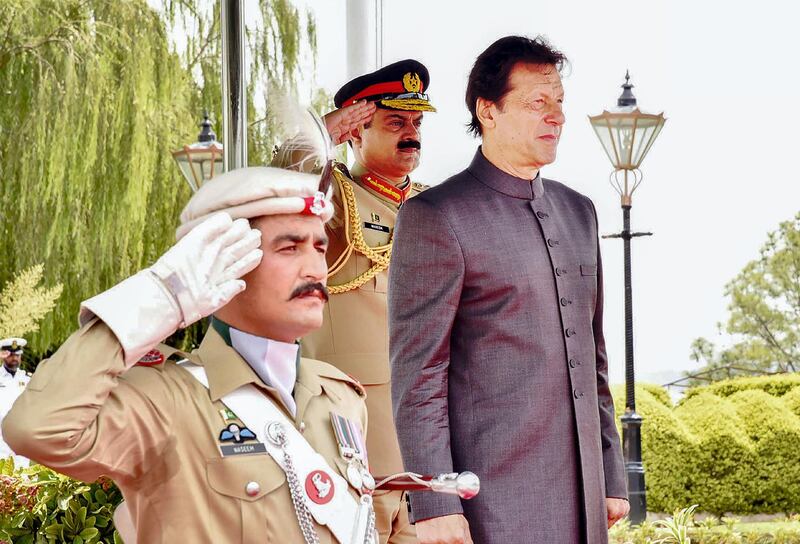As his party's campaign began to take off ahead of this year's general election, Imran Khan released an ambitious agenda setting out how he would transform Pakistan.
The goals unveiled by his Pakistan Tehreek-i-Insaf (PTI) party promised to deliver so quickly that even the first 100 days in office would see irreversible change in the country's direction.
His first three months would see steps to begin overhauling governance, to clean up the police and bring justice for all. A job creation scheme would be set running to start providing new employment for 10 million people while a programme to build five million homes would be set up.
Fast forward to a little over six weeks into his tenure as Pakistan's 22nd prime minister and his populist opposition movement is not surprisingly finding that delivering that agenda is proving harder than making campaign promises.
His first weeks in office have not been spent building the Islamic welfare state he vowed to his ecstatic supporters, but instead grappling with compromises and a looming economic crisis.
In an uncertain honeymoon period, critics complain that rather than solid reforms, the former cricketer's party has only churned out a string of populist, eye-catching stunts that occasionally backfire.
“To some extent they are still behaving like an opposition,” said General Talat Masood, a senior Pakistani military officer-turned political commentator.
After years bemoaning the lavish lifestyles and corruption of Pakistan's ruling elite, Mr Khan has preached austerity. He has cut staff and moved out of the palatial prime minister’s residence. He has sold off limousines and even buffalo kept by his predecessor Nawaz Sharif.
But his frugality came under question when it emerged that he was commuting by helicopter daily. The much-vaunted sale of luxury government cars that raised $600,000 or the buffalo auction, which raised $19,000, did little to dent the country's need for a $12 billion bailout.
The government has said it wants to avoid begging at the International Monetary Fund (IMF), but alternative loans from Chinese or Saudi allies have yet to appear.
”Pakistan doesn't need gimmicks, it needs some solid efforts to transform its economic policies,” said Gen Masood.
_________
Read more:
Sheikh Mohammed bin Zayed holds talks with Pakistan Prime Minister Imran Khan in Abu Dhabi
Pakistan's Khan says austerity begins at home
_________
Mr Khan has also lent his personal backing to a crowdfunding attempt to build a $14bn dam in the country’s northeast. Donating has been framed as a patriotic duty with anyone opposing the scheme under suspicion of treason. At the current rate of donations, it will take decades to build.
Yet the charge of style over substance is unfair, according to Jan Achakzai, another political commentator.
“If you are asking for loans, for aid, you need to make sure that the lavish lifestyles of ministers is checked. That's the message he was trying to make,” he said. “What is a better way than to start with these colonial era houses. I think he started it on the right note.”
Other financial suggestions to resolve the country's economic woes, such as banning imports of luxury cars, smartphones and even cheese have been met with mockery.
Mr Khan's early attempts at resolving some of the country's thorniest problems have also foundered. When he followed his victory speech olive branch to Delhi with a suggestion the rivals meet for talks, there was briefly the prospect of a thaw in relations.
But Delhi took less than 24 hours to pull out of the proposed meeting with a blast of bellicose language. Relations are now more strained than before Mr Khan started, leading some to accuse him of worsening the situation with an ill-formed diplomatic overture.
An offer to begin implementing long-standing laws that would provide Afghan refugees with Pakistani citizenship was met with astonishment and then anger from vested political interests fearing the emergence of powerful new voting blocs.
“This is a political minefield, no government has tried to touch it,” said Mr Achakzai.
“He's raised it, he's set up a task force to come up with a strategy, it's something unconventional he has set out to do.”
A decision to appoint an advisory panel of economic experts to advise the new prime minister also ended in recrimination.
Religious hardliners objected to the appointment of the distinguished Princeton economist, Atif Mian, because he is an Ahmadi Muslim. After the new government at first stood by the appointment, the PTI then caved in to appease the extremists. Two other distinguished economists then resigned in protest at Mr Mian's treatment.
Yet for all the problems, Mr Khan has had far more success than his predecessor, Nawaz Sharif, in one all important sphere of government: maintaining relations with the powerful military.
The rollercoaster start to his term has emphasised the government's lack of experience, Gen Masood said.
“I think that they are in the learning process as far as governance in concerned,” he said.





